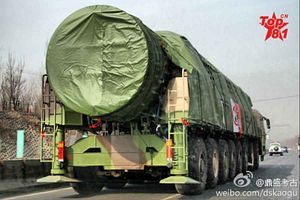A few defense and security reads to wrap up your week:
Did China test its DF-41 inter-continental ballistic missile near the South China Sea? Bill Gertz, at the Washington Free Beacon, has reported on China’s testing of a multiple-warhead capable inter-continental ballistic missile (ICBM) system, the DF-41. In a follow-up report to his original scoop published Thursday, Gertz makes the claim that the DF-41, according to a Chinese statement, was test fired “near the South China Sea on April 12.” The implications of this are huge, if true, considering that a multiple, independently-targetable reentry vehicle (MIRV) capable ICBM test in the disputed waters of the South China Sea would be hugely provocative. This, however, doesn’t appear to be the case. We don’t know where the DF-41 was tested, and the Chinese “statement” referred to in the report actually references a question posed by a reporter to the Chinese Ministry of Defense spokesperson (hat-tip to MIT’s Taylor Fravel). A statement posted to the Chinese Ministry of Defense’s website notes that the “test location reported by the media is pure conjecture” and doesn’t confirm where the test took place. But, so far, it doesn’t appear that China has quite the audacity to test highly destabilizing MIRV-capable ICBMs over the South China Sea.
India’s way of getting back at China over the Azhar episode? India has drawn protests from China after granting a visa to Dolkun Isa, a Uyghur activist based in Germany who is considered a terrorist by China. The Chinese government claims that Isa, who is affiliated with the World Uyghur Congress, is also affiliated with the East Turkestan Liberation Organization, a designated terrorist organization allied with the East Turkestan Islamic Movement and the Taliban. Some observers have already pointed out that the visa award might be India’s way of prodding Beijing back over a recent episode concerning Masood Azhar, the leader of Jaish-e-Mohammed, the terror group thought to have staged January’s attack on the Indian Air Force’s base at Pathankot. China blocked an Indian motion at the United Nations to list Azahar on the list of banned persons and entities pursuant to Security Council resolution 1267. The tit-for-tat approach might serve short-term interests for India, but could undermine longer term counter-terror cooperation between the two countries.
Pakistan claims India didn’t notify it of SLBM test. The Pakistani foreign ministry claims that India did not, in accordance with established confidence-building measures, notify Islamabad of its recent testing of the K-4 submarine-launched ballistic missile, the primary deterrent tool for its Arihant-class nuclear submarines (hat tip to Vipin Narang). A February 1999 memorandum between the two countries sets up ballistic missile testing pre-notification requirements. Notifying adversaries of regular testing is generally considered stabilizing and prevents misperceptions that could lead to unintentional escalation.
The Pakistani military gets serious about corruption. Taking a page from its close ally, China, Paksitan’s military is getting serious about cracking down on corruption within the ranks. General Raheel Sharif, the powerful chief of army staff, fired six senior officers over graft. The anti-corruption crackdown within the military takes on special meaning given that it coincides with heightened public scrutiny of Prime Minister Nawaz Sharif’s offshore dealings, as recently revealed by the Panama Papers leak.

































